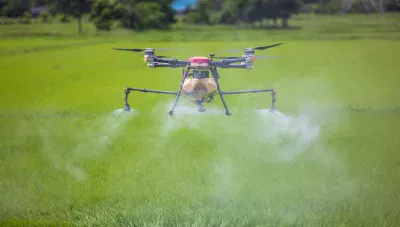Get A Quote
Complete the form below, and we'll connect with you shortly!
+91 82409 77034
Tree counting by drones is transforming how we monitor and manage forests, offering a powerful solution for environmental monitoring and conservation. Drone For Surveying can accurately count trees, assess forest health, and track growth patterns over vast areas. This technology eliminates the need for time-consuming and costly manual surveys, providing real-time data that helps researchers, conservationists, and land managers make data-driven decisions.
By using survey drones for tree counting, we can efficiently track biodiversity, monitor deforestation, and plan for sustainable forest management. Whether for reforestation projects, carbon sequestration studies, or wildlife conservation, drones make tree monitoring faster, more precise, and environmentally friendly, helping us protect and preserve our forests for future generations.
Complete the form below, and we'll connect with you shortly!
Tree counting by drones is a modern method of monitoring and assessing forests using aerial technology. Survey Drones, equipped with high-resolution cameras and LiDAR sensors, are flown over forested areas to collect detailed data on tree count, size, species, and overall forest health. These drones capture accurate, real-time imagery that eliminates the need for traditional, time-consuming manual surveys.
Drone For Surveying provides valuable insights into biodiversity, deforestation rates, and the growth patterns of forests. Tree counting by drones is widely used in reforestation projects, carbon sequestration studies, and environmental conservation efforts. It enhances the accuracy and efficiency of forest management, allowing for data-driven decisions that help protect and sustain natural ecosystems.
Complete the form below, and we'll connect with you shortly!
Various fields apply tree counting using drones, including:

Survey Drones are revolutionizing forestry management by offering a precise way to assess tree populations, monitor growth rates, and evaluate forest health. Using Drone For Surveying, we gather real-time data to identify trends and track changes in forest ecosystems. This technology not only helps in sustainable forestry practices but also supports efficient resource management, ensuring that forests are maintained and utilized responsibly for future generations.

Survey Drones are transforming ecological research by providing a powerful tool to study biodiversity and habitat conditions. With real-time aerial data, researchers can monitor changes in forest ecosystems over time, track shifts in species populations, and assess the impact of environmental changes. Drone For Surveying allows non-intrusive, accurate observations, offering deeper insights into ecosystem dynamics and helping drive informed conservation efforts.

Drone For Surveying plays a vital role in land use planning by delivering accurate data on tree cover and green spaces. This technology enables urban and regional planners to make informed decisions about land development, conservation, and environmental preservation. By mapping and analyzing green areas, drones help ensure that urban expansion is balanced with sustainable growth and preservation of natural resources, contributing to healthier, more livable cities.

Drone For Surveying enhances carbon accounting by accurately measuring tree biomass and density to estimate a forest's carbon sequestration potential. By providing precise, real-time data, survey drones support efforts to understand how much carbon forests can absorb, playing a crucial role in climate change mitigation. This technology helps track environmental impacts, improve sustainability efforts, and inform strategies to reduce global carbon footprints.

Drone For Surveying is revolutionizing wildlife habitat assessment by providing detailed, real-time data on habitat conditions. This technology enables ecologists to evaluate ecosystems and monitor changes that affect biodiversity. By assessing environmental factors from above, survey drones ensure that management practices align with conservation goals, supporting the health and protection of vulnerable species and promoting sustainable ecosystems.
The deliverable outputs from tree counting using drones typically include:
High-resolution images capturing the forest landscape, providing visual context for analysis.
Image analysis generates accurate counts of individual trees. Species identification is also included where applicable.
Detailed three-dimensional representations of the forest, illustrating tree height and density.
Maps depicting the extent of tree cover and canopy density, useful for assessing forest health and land use.
The documentation includes methodologies, findings, and recommendations. It focuses on forest management and conservation practices.
These outputs provide critical information for forestry professionals, ecologists, and land managers. They enable informed decision-making and promote sustainable forest management practices.

You can see how this popup was set up in our step-by-step guide: https://wppopupmaker.com/guides/auto-opening-announcement-popups/